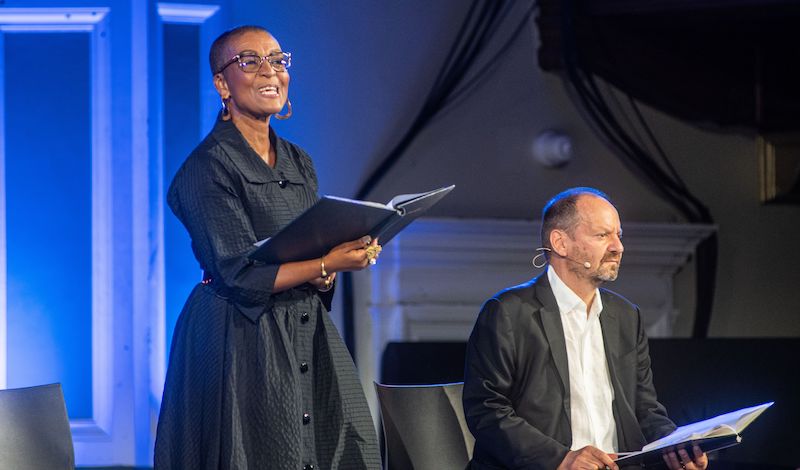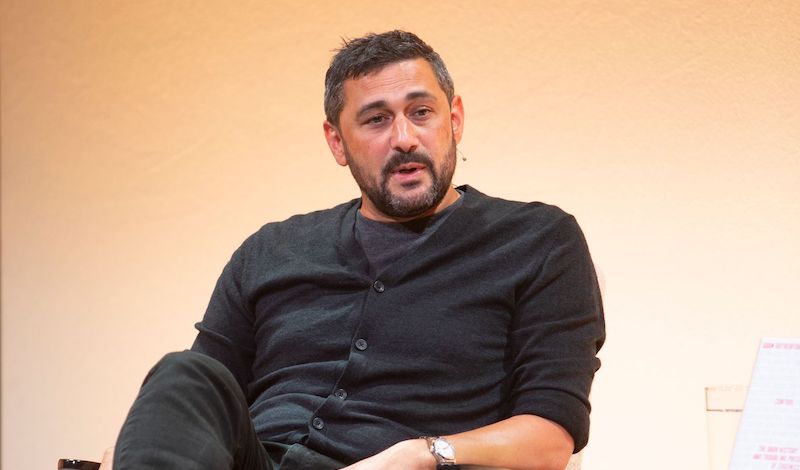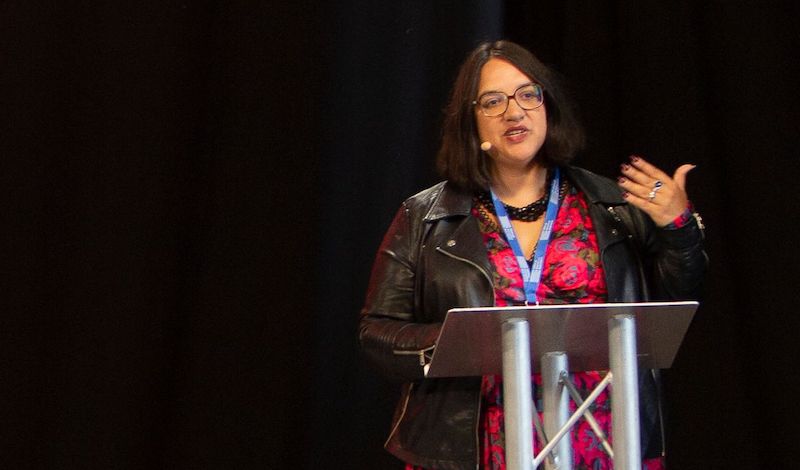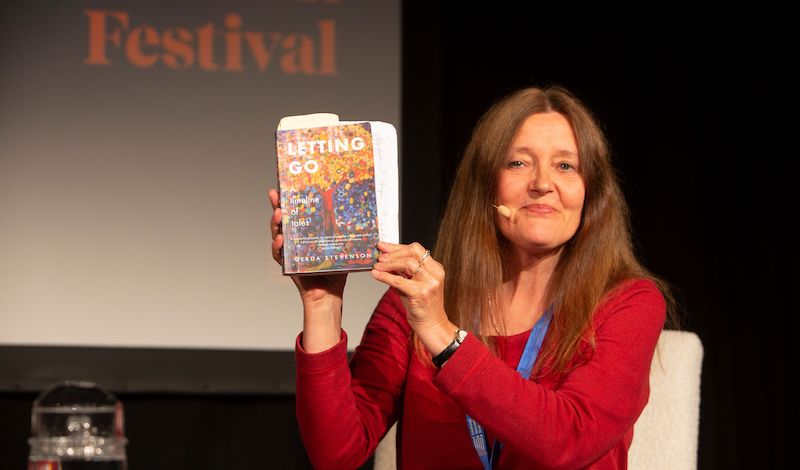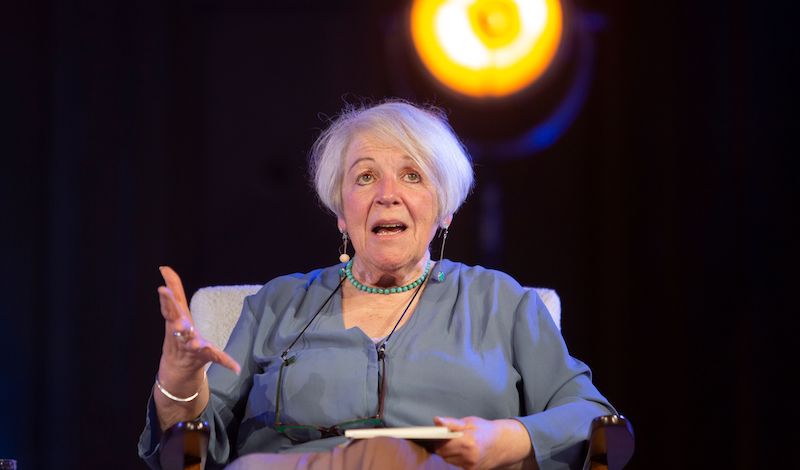Book Festival Round-up Part 2
More theatre-interests at the Edinburgh International Book Festival
By Hugh Simpson
The last week of the Book Festival featured the usual quota of theatrical presentations, ‘theatre-adjacent’ events, and other writers so entertaining as to need no apology for being featured here.
The Last Colony was one of those hybrid events, part reading, part theatre, part music, which the festival has excelled at presenting. It was based on the book by Philippe Sands QC about the forcible removal of the inhabitants of the Chagos Islands in the Indian Ocean by the British government, to facilitate the opening of an American airbase.
The subject has been presented on stage – for example by Nathaniel Brimmer-Beller’s Chagos 1971 for Black Bat Productions at the fringe in 2019 – but it remains a frighteningly little-known and shameful episode in the UK’s supposedly ‘postcolonial’ history.
Sands was joined by pianist Guillaume de Chassy and the wonderful Adjoa Andoh, who played Liseby Elysé, a Chagossian who gave a representation to the UN. It was an extraordinary combination of advocacy, reportage and performance with Andoh in particular luminously magnetic, and must count as one of the most powerful things witnessed on an Edinburgh stage this year.
The islanders’ removal was justified on the grounds that they were not permanent inhabitants but ‘contracted labourers’ – even those whose families had lived there for generations, or who were less than a year old.
diplomacy
Sands’s determination to represent them, and his awareness that he is in no way the centre of the story, were once again to the fore in later discussion with Olivette Otele. All of his legal training and diplomacy were on display, especially when having to respond to someone who was apparently one of those inexplicably large numbers of apologists for Vladimir Putin populating audiences this year.
Suffice it to say that anyone still harbouring illusions that the Iraq war, Brexit and what was described as the Alice in Wonderland approach of the Johnson government have not all but destroyed the UK’s reputation in the world at large, would soon have been put right.
However, Sands still believes that, despite everything, in the end the right thing will be done for Chagos because of the still existing, if deeply buried, respect for professionalism and decency.
Not everyone appearing at the book festival would appear to share this view. Geneticist and broadcaster Adam Rutherford is such an effective, genial and educational presence that his appearances are always thoroughly enjoyable. However, on this occasion the discussion of his book Control: The Dark History and Troubling Present of Genetics, took some decidedly dark turns.
In conversation with Gwenetta Curry, the widespread, but now much ignored enthusiasm for ‘racial improvement’ was laid bare, as well as how much of modern science is built on structural racism. Particularly shocking was how recently forced sterilisations, largely of women of colour and indigenous people, took place in the US.
Not only that, but the ‘declinism’, the myth of a lost Golden Age that gave the idea much of its impetus, is what continues to drive MAGA-style populism today. “People are terrible, aren’t they?” said Rutherford offhandedly, and it was hard not to agree.
unrelenting pressure
The audience for poet, playwright and Edinburgh Makar Hannah Lavery would be forgiven for reaching the same conclusion, despite the beautiful poetry in the event. Scotland, You’re No Mine detailed the unrelenting pressure felt by artists of colour in Scotland, not only through prejudice but also from the unending expectation to ‘represent’ and to be constantly symbolising something, rather than just being yourself.
Revelations about some of the reaction to the magnificent Lament For Sheku Bayoh, in particular from theScottish Police Federation, were particularly shocking.
Like Lavery, Liz Lochhead creates work for the printed page and the stage, but few writers enjoy the privilege of launching a 50th anniversary edition, as she recently has – for her debut collection Memo For Spring.
Lochhead always seems at home with an audience, and the discussion with her friend, the versatile actor and presenter of the Cultural Coven podcast Nicola Roy, was thoroughly entertaining and informative. Lochhead shares with Rutherford a refreshing inclination to answer with monosyllables, or even dismiss, questions that are outside their sphere of knowledge (or, in Lochhead’s case, in which they had no interest).
Lochhead, of course, is now something of a Scottish national treasure (although she would probably hate the description). It is a mystery why similar attention is not afforded to the actor, writer, director, musician and just about everything else that is Gerda Stevenson.
Stevenson’s recent collection of short stories Letting Go (which includes a reworking of her play Skeleton Wumman) was the reason for her appearance in the Wee Red Bar, where her extraordinary versatility, craft and knowledge shone through in a wide-ranging, stimulating hour.
judgement and delicacy
Another writer given to peppering appearances with musical interludes is novelist, songwriter and member of the Fun Lovin’ Crime Writers: Douglas Johnstone. Dark Hearts, the fourth in his Skelfs series about an Edinburgh family of female funeral directors-cum-PIs, was celebrated with great judgement and delicacy.
Many writers, even those who accept invitations to appear at festivals, are overly diffident, or too keen to adopt that off-putting manner that Lochhead describes as ‘the poetry voice’. Johnson, however, is an engaging speaker who seems both bursting to talk about his ‘existential noir’ but also is acutely aware of the absurdity of the whole process.
A genuine theatrical performance was provided by the Iron Annie Cabaret, a stage version of Luke Cassidy’s novel about Aoife, a Dundalk drug dealer, and her relationship with the mysterious Annie.
Rather than being a gritty underworld crime tale, it is largely presented as a love story. In truth, the straightforward telling of the story lacks a little sparkle, despite the supreme efforts of performer Georgia Cooney.
However, the energy of the source is more than adequately represented by the other parts of the performance, with two contrasting styles of musical accompaniment – from punk band False Slag, and folky songs written by band The Dandelion Few and performed by Annie June Callaghan.
Although there is some interaction between the musicians and the actor, and Callaghan’s role in proceedings takes on more significance as the performance progresses, there is a disconnection between the various elements that is never fully resolved, something that the billing as a ‘cabaret’ rather than a play tacitly acknowledges.
Nevertheless there’s an undeniable energy to it all and unlike many such presentations in the book festival, it is a fully finished production that has toured in Ireland, and comes across as an accomplished piece of theatre, pacily directed by Rhiann Jeffrey.
considerable buzz
In common with every other aspect of this year’s extravaganza, the Book Festival may not have succeeded in reclaiming all its previous audience, but some high-profile events in the closing days made for a considerable buzz.
There are still some problems with the Book Festival site which, given it is only intended to be in use for one more year, may not be worth the effort of resolving. However, it is the case that many Edinburgh residents who are happy to see the back of the Fringe (even when not accompanied by knee-deep rubbish in the streets) are more than a little sorry when the book festival closes.
The Book Festival will return to Edinburgh College of Art in 2023
Many events continue to be available to watch online on a pay-what-you-want basis.
ENDS








